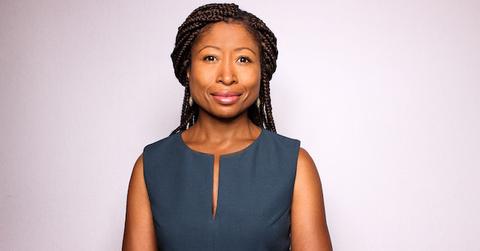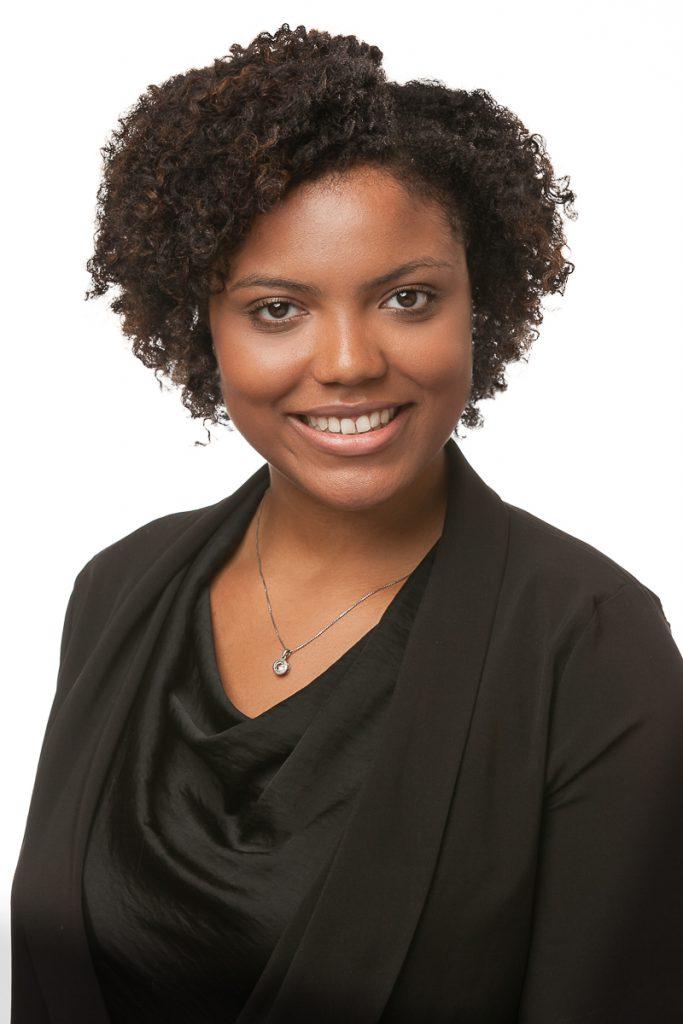With an appreciation for and skill in successful communication, Dr. Angela Jackson has traveled the globe understanding, connecting to, and building relationships with communities who differ from her own to create transformative impact. Having worked across for-profit and nonprofit, she joined New Profit as a Partner to run the firm’s Future of Work Initiative.
In light of COVID-19, the importance of planning for and investing in the future of work discussion has intensified as the new normal is navigating a virtual workplace. According to a recent Forbes article, during the early stages of the outbreak’s economic fallout, 90% of the decrease in employment – or 2.6 million of the total loss of 2.9 million between February and March – arose from positions that could not be teleworked. Through her work, Dr. Jackson is asking who is most impacted by this and tackling the problem head-on.
As an investor activist, Angela is focused on revolutionizing how today’s learners develop power skills defined as human skills and mindsets that uniquely complement technology and are in high demand by employers.
In addition to her experience working across sectors, Dr. Jackson is a social entrepreneur herself as the founder of Global Language Project (GLP), an educational nonprofit leveraging world language learning to equip students for opportunities in higher education and the workforce. Her firsthand experience and drive scaling an organization give her a unique skill and relatability supporting entrepreneurs now as a funder.
Her Agenda sat down with Dr. Angela Jackson to chat about her global experience, leveraging language to advance professional goals and her team’s launch of the Future of Work Grand Challenge.
Her Agenda: You have worked abroad in over 25 countries throughout your career, how did your global work influence the way you think about impact up until this point?
Dr. Angela Jackson: It’s not lost on me that the work that I was able to do allowed me to earn a great living. I was earning in a month, what my grandparents would earn in a year. I asked what was the difference between me and them? I realized part of it was access to information about good jobs and what the possibilities are. Most of my work has involved coming up with ideas but until the end of my grandparents’ lives, they never really understood what I did, it was never introduced to them as a possibility. And so again, that drives me to ask where are the youth and adults out there who may not know that certain careers or pathways exist for them?
It is important to introduce those so then people can have a choice. They may still want to choose to work in a factory. And that’s great, or they may choose to do something else. I think knowing that you have options and choices is really significant. That is the game-changer.
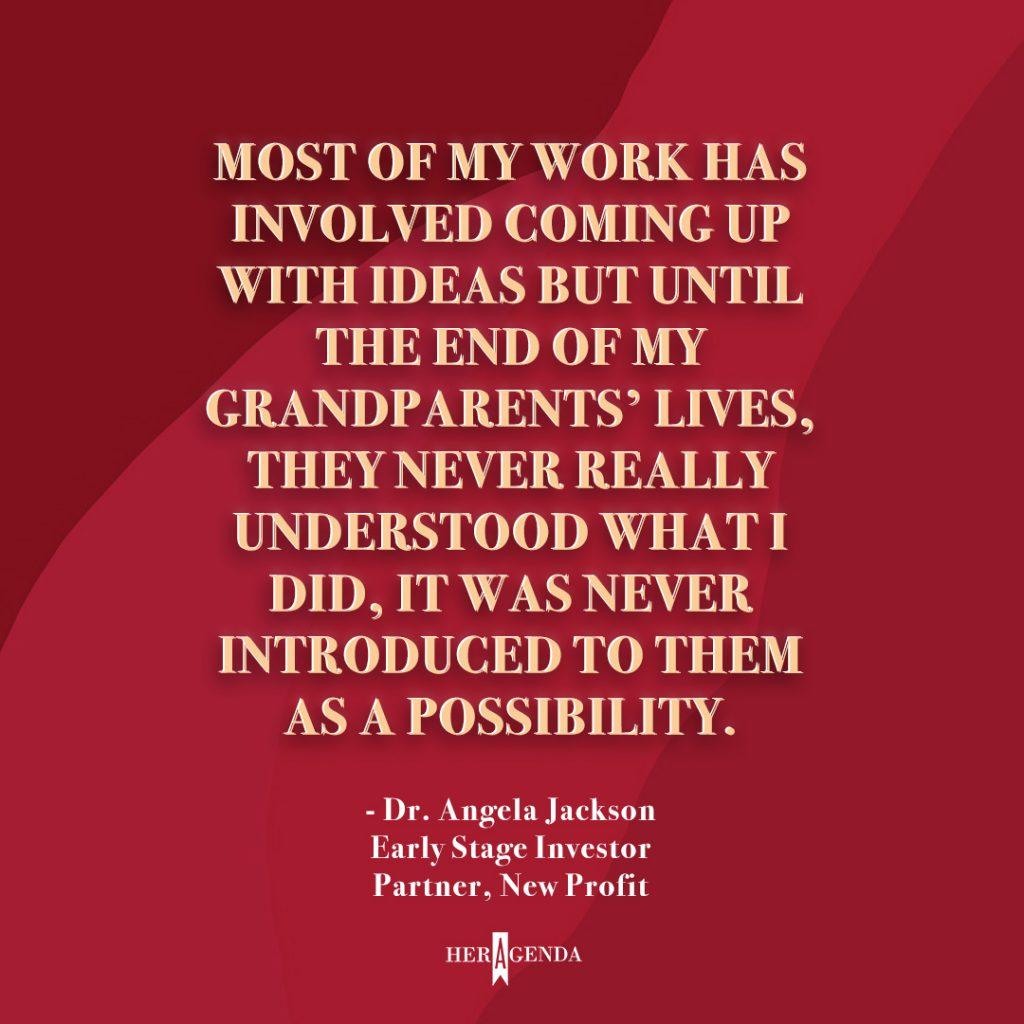
Her Agenda: Is there a moment in your career that you would say had the biggest impact on where you are today? If so, what was it and why did it influence you?
Dr. Angela Jackson: [Yes, at the time] I was working for Sony Pictures. It was one of my first jobs [working] as an assistant in the marketing department. There was a woman there, Vicki Brayden who was VP level at the time. She started giving me more and more responsibility. She saw things in me at that time that I don’t even know that I saw in myself.
I remember she asked me to go on a trip with her. We were going to Kansas City for a marketing presentation on Sony’s products. I was going to be her assistant. I arrived and her flight was delayed so she was unable to be there for the presentation. She called me and said, ‘Angela, you have to do it.’ I thought, how can I do this? I did it and then I realized at that point, I found my calling.
I went to school for journalism and after working in journalism for six months, I realized I wasn’t interested in pursuing it further. I was working at a local TV station. I’d come in with my happy go lucky story, and then someone was hit by a car so I was told to go out and cover that. I had to forget about my story. But what happened with marketing and how I fell into it was my experience that day, I realized [marketing] was about relating to people. It’s about communication and championing something you believe in. For me, that came innately which struck this chord. I said to myself I want to do more of this. It was such a pivotal moment.
Firstly, because someone again saw something in me that I didn’t see in myself which pushed me further. Secondly, I moved past my fear of falling and was courageous enough to try. That has been a consistent theme in my life, people ask if I am fearless? No, I have fear, but I’ve learned to work past that. I try to be courageous and take the next step and have faith that it’s going to work out. If it doesn’t, I’ll learn from it.
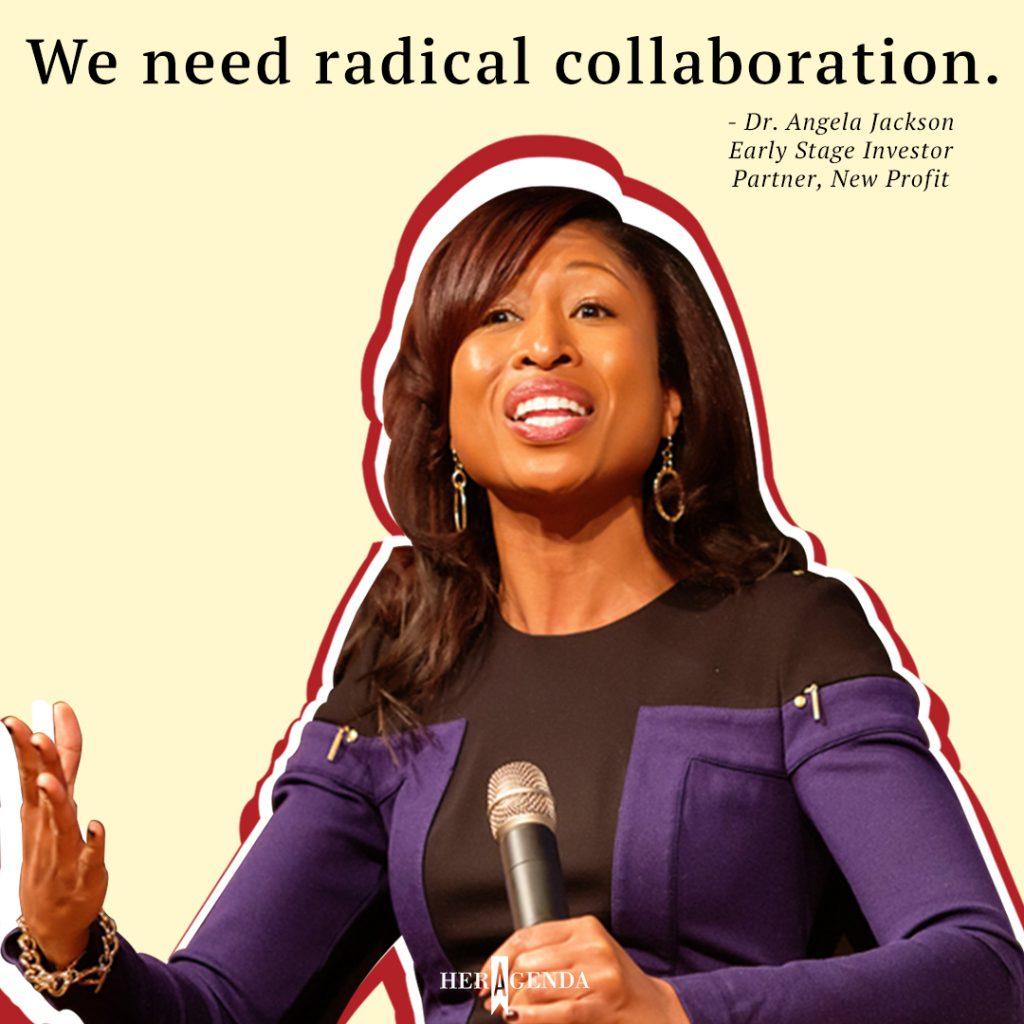
Her Agenda: You have experience working across sectors, how, if at all, has that informed your thoughts about social entrepreneurship and innovation? How does it inform the way you invest as a Partner at New Profit Ventures?
Dr. Angela Jackson: My cross-sector work gave me a level of understanding of how things work and how change happens. Originally as an entrepreneur or even as a social entrepreneur, someone will have an idea. [For example, they’ll share something like] ‘I have a program that I want to do in a school.’ Right. And they say, I’m going to start my program. What they may have not taken into account is what I call the ecosystem or the context. What needs to be true for you to be successful in that school, with your program? What is going on that you may not have known about with teachers, with unions, with the principal, with the parents, and with the community? And many entrepreneurs are so focused on just their product and delivering it but are missing the ecosystem. That’s usually where they get hung up. So when I’m investing in an entrepreneur, I’m looking to see what insights they have about that ecosystem.
If you don’t think about that context, 9 times out of 10 your intervention, program or product won’t be successful. If we do invest in someone who hasn’t done this work, it is an entrepreneur who is willing to learn and go down that journey.
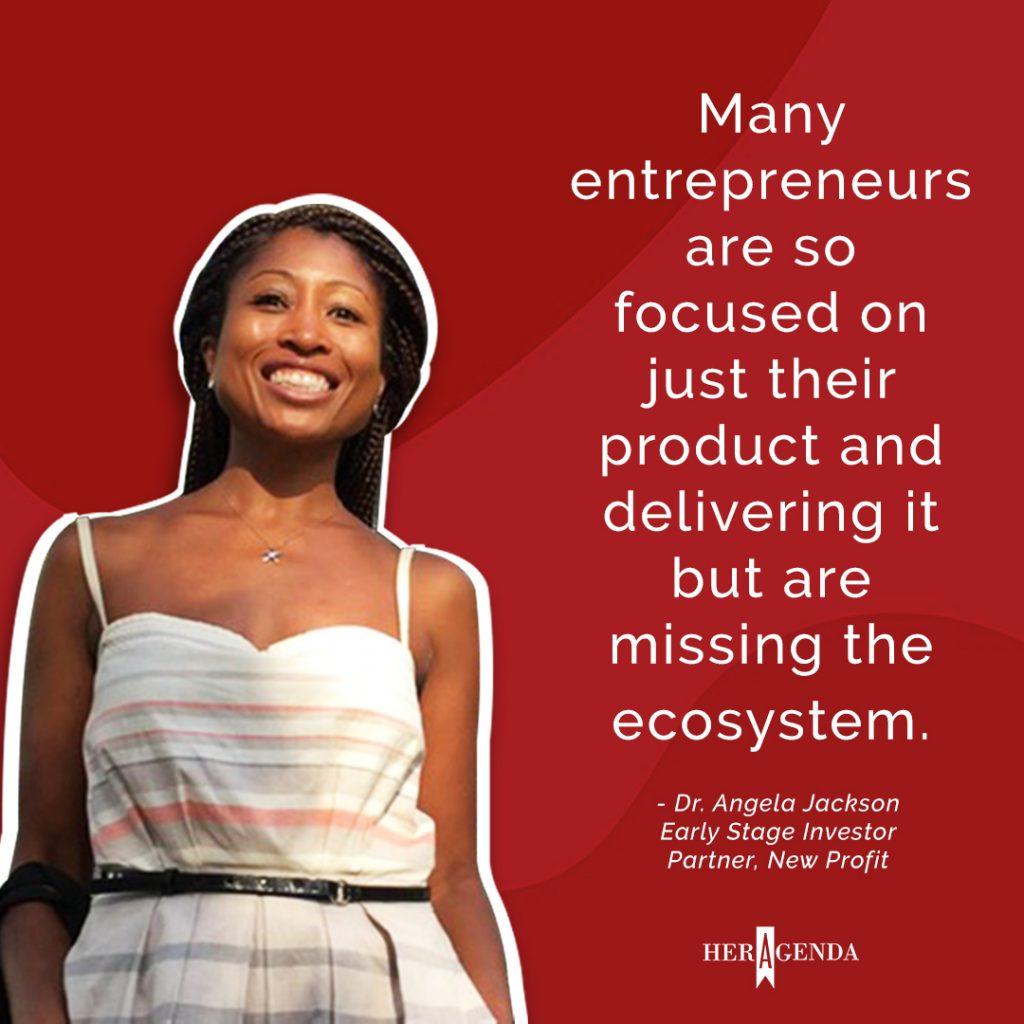
Her Agenda: You founded the Global Language Project to equip disadvantaged public school students with the skills to compete in a globalized world and workforce through foreign language acquisition. What role do you think languages play in the trajectory of people, particularly women’s careers?
Dr. Angela Jackson: I would say when I was running the Global Language Project, language is powerful in its simplicity. At its base, it gives you an opportunity to communicate with a third culture, a new group of people in a language they understand. If you want to sell somebody something you need to sell it to them in their language. You need to speak to them in a way that they understand. And that is what language gives you.
The second thing I think is really important is that it is really a workforce play. When I was working at Nokia, I was leading international teams. I was leading work in China and also in the UK. In China, I needed people who spoke Chinese, I was working through translators so I didn’t care if a person went to City College of New York, if they had fluency in Mandarin their resume immediately went to the top.
When you think about working at a place like the United Nations having a second or third language is required. That doesn’t happen overnight so I wanted parents and kids to know about this sooner than later. Additionally, I think when you speak another language as an African American, people don’t expect you to. They really don’t. People don’t expect me to speak Spanish and French. Sometimes it takes that second look for you to get out of the box that people have already put you in. I’m always about confounding expectations. I think that that can be our superpower.
Her Agenda: Your team recently launched a $6 million Future of Work Grand Challenge, powered by XPRIZE and MIT Solve, to rapidly reskill 25,000 displaced workers into living-wage jobs in the next 24 months. What inspired the idea behind this challenge?
Dr. Angela Jackson: When I joined New Profit two years ago to lead their Future of Work Initiative, at that point, the team was really focused on upmarket solutions. So the approach was how can we take middle-level executives and get them to higher-level jobs and pay. When I started looking at research from Brookings and McKinsey about the future of work, (this is pre-COVID) the future of work was going to disproportionately impact people across race, so Black, LatinX, indigenous, and people with lower socioeconomic backgrounds. So I thought as an impact investor, why are we thinking about how we move middle executives to higher pay? We should be thinking about the people who are disproportionately impacted by automation. And when I did more research, I found out that most employers spend 80% of their professional development dollars on higher-level executives. And that rang true to me.
I was able to go to NCI Business School during my time with Nokia, an opportunity I could have afforded myself, but because I was in the senior ranks, they paid for it. I thought what if employers began to looking at their entry-level or lower-wage workers and investing in them at that level instead. And then I thought, what would need to be true, going back to the ecosystem piece, for that to happen? I said, well, we need actual solutions that are targeted.
A lot of the accelerated learning programs, you have to have a degree. I said, what if we were to inspire innovators to think about those learners with barriers to employment and create solutions for groups like working parents so that education works with their schedules. One way that we can incentivize that happening is by creating a challenge to use money, money is a great lever, right?
Today we have over 800 people who have applied. Applications are still open until November. All of those applications asked, how are you doing this for people with barriers to employment? By barriers, we said, they don’t have a college degree or didn’t make a living wage last year. We were intentional about asking how are you designing solutions for them? Then we also asked these entrepreneurs, what are your key insights about this unique community? We started a worker advisory board of workers who have been impacted by COVID and they’re going to help us select these solutions. We really want to make sure that when we’re investing these dollars, we’re investing them in entrepreneurs and innovators who really have a mission and passion for what we’re doing.
Her Agenda: As a venture philanthropist, your work aims to catalyze visionary social entrepreneurs, organizations, and initiatives that can break through and impact the lives of millions of people. What is your hope for philanthropy as a whole in light of what you have seen through your unique model?
Dr. Angela Jackson: Our firm was founded 20 years ago. Our CEO, a woman, saw that in VC, entrepreneurs received risk capital to scale their organizations and their ideas. If you look at the social sector, specifically if you’re talking about the social sector with organizations led by people of color, we receive programmatic support, right? So we don’t have that operational capital and that risk capital to really think about scaling our businesses, try new models, and add capacity. We typically find that we’re operating sub-capacity. So in venture philanthropy, what I’m loving is that we’re saying everyone deserves that risk capital and that operational capital. You can’t put a hundred percent in programs if you’re not growing your operations won’t grow. The second piece of it is we are really looking at big, bold, audacious problems, In traditional philanthropy, historically it has been we’ll do this program for just 10 people and we’re able to help those 10 people so that’s great.
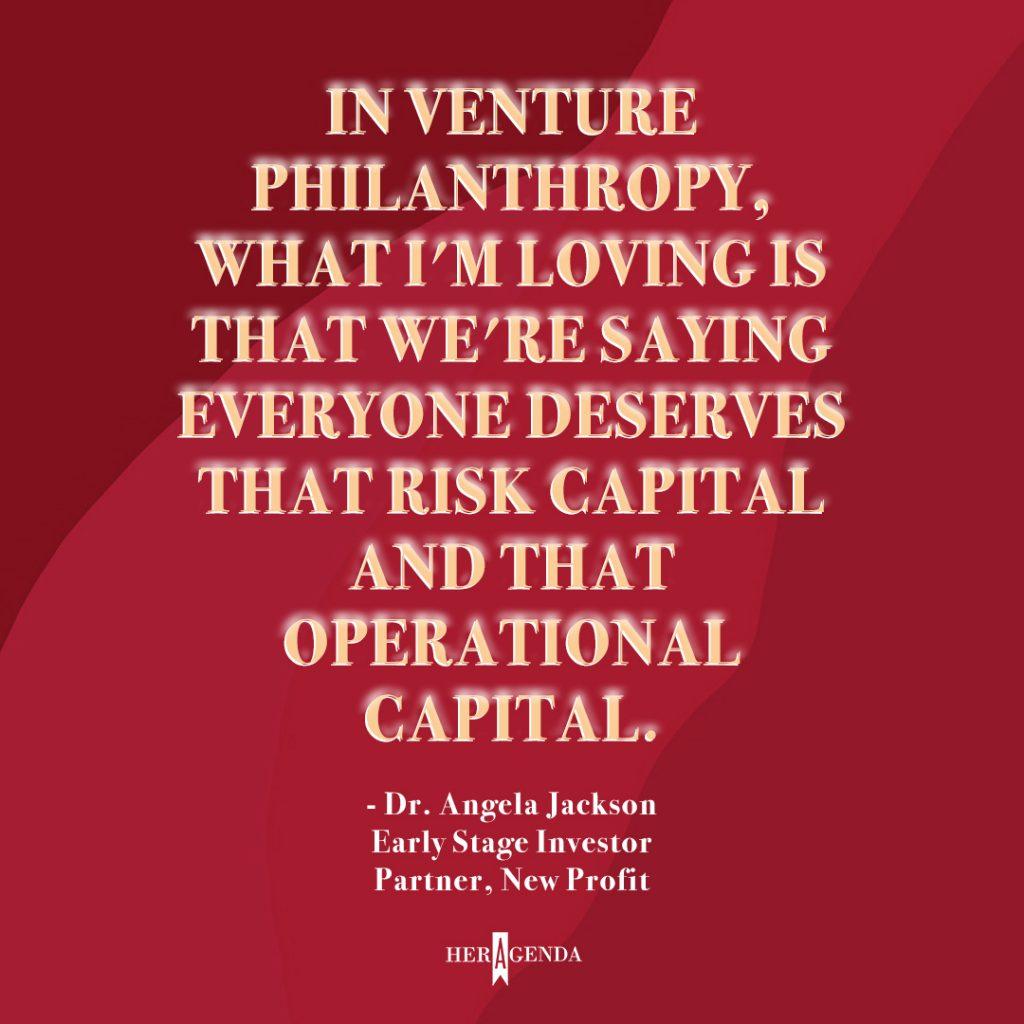
I remember growing up I heard about programs like Prep for Prep or MLT. They are doing fantastic work, but there are places where kids who don’t live in New York or other dense areas don’t get access to these opportunities. We really need more entrepreneurs with these brilliant ideas that are proven to scale so that we can reach more kids and more adults who are interested in learning. That’s where we are super focused on scale and scale that makes sense for the entrepreneur. It could mean going to another state or investing deeper in the community.
Her Agenda: For diverse entrepreneurs, the number of funding allocated can be disparaging. What tips would you provide to founders in order to help maximize their opportunity for access?
Dr. Angela Jackson: Yes, there are two things. The first being that entrepreneurs have to talk to one another. There’s this myth out there that if I tell you my idea, if I tell you who my funder is, then that might take away from what I have. No, at this point we need radical collaboration. We need to share resources. We need to partner.
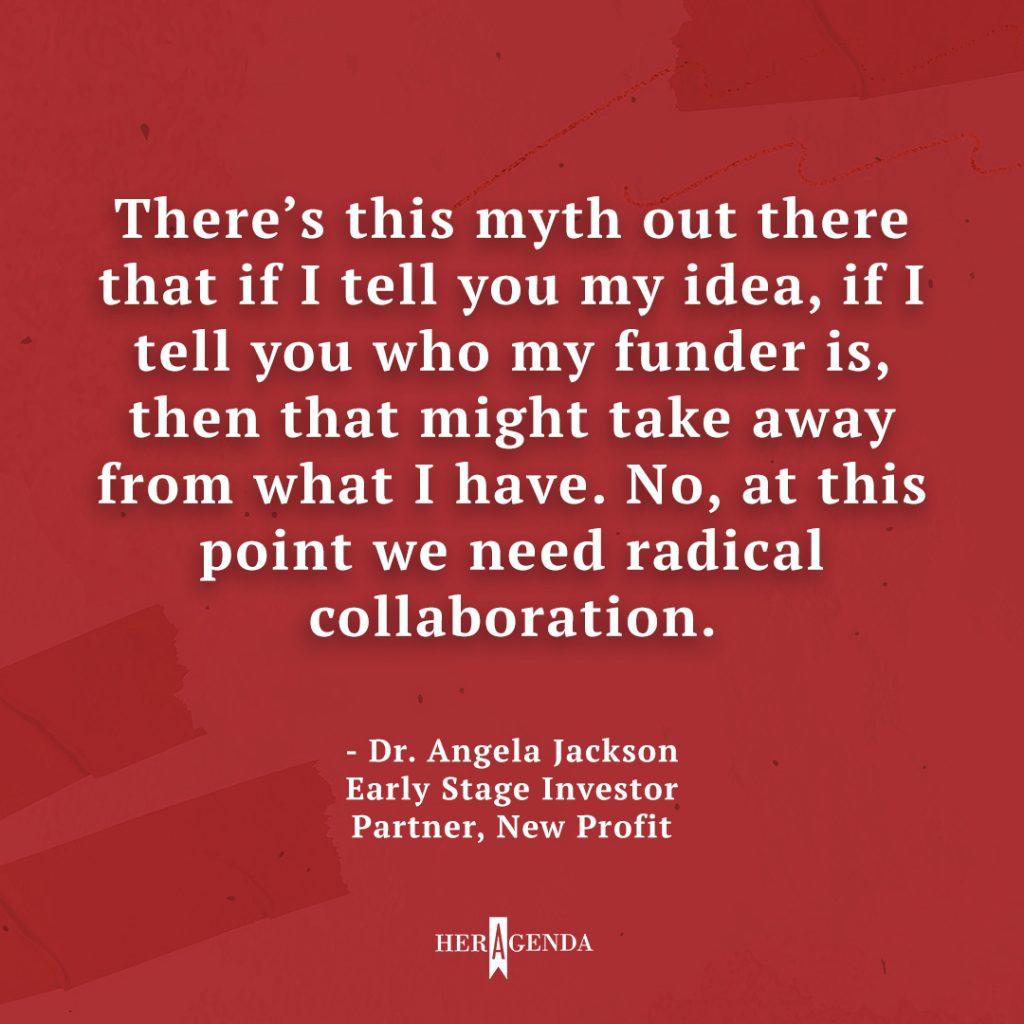
I give lots of advice to entrepreneurs, but really, I try to use my voice with funders. Funders have to be more accountable. We need to stop applauding funders for giving out money and understand who they are giving it out to and who they are not. There is a recent report put out by Echoing Green. They say that when they looked at the same white founders and Black founders, the white founders got more support, higher dollars for more years than their Black founder counterparts with the same idea. We can’t keep putting it on the entrepreneurs to do something different. We really have to begin with those of us with seats, with microphones who work in philanthropy. We really have to call other philanthropists to task. What is going on here? We are committed to change and sp we need to change our giving practices.
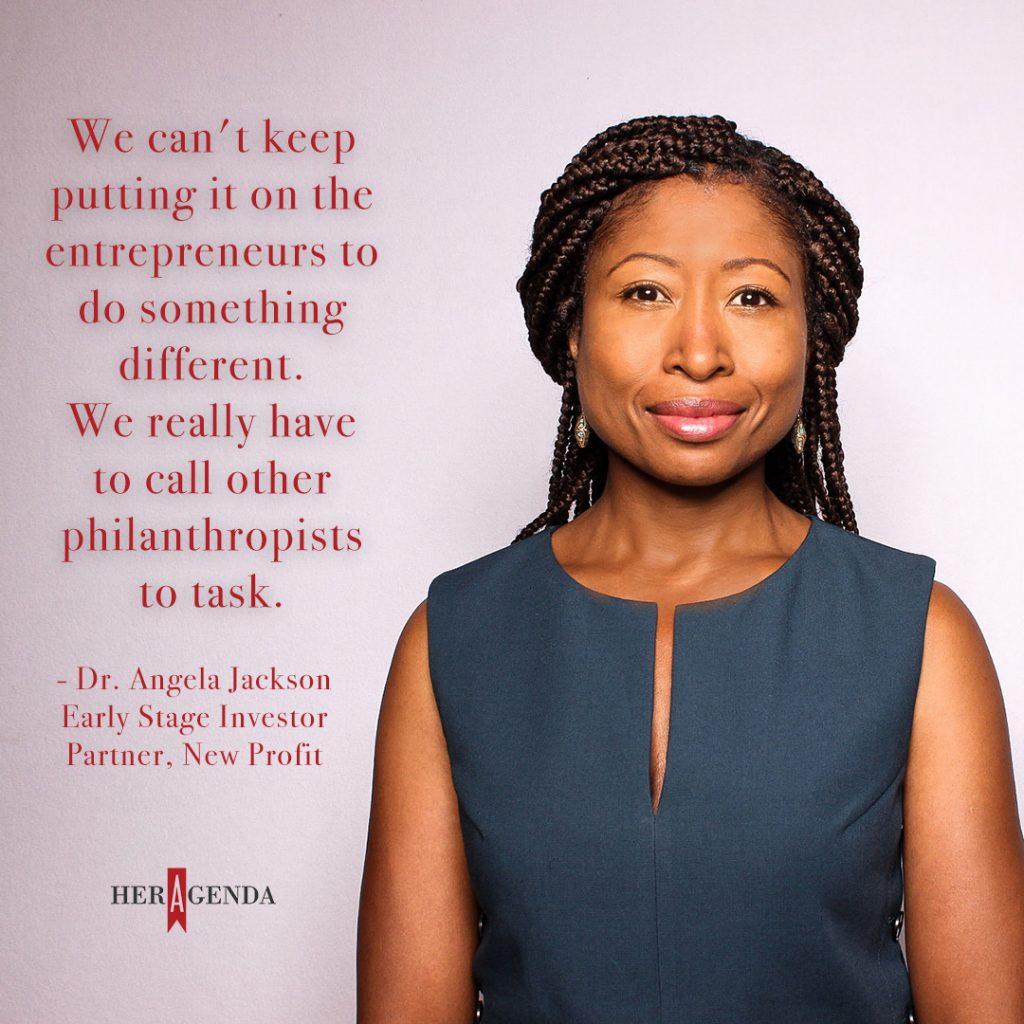
Her Agenda: You write about innovating and investing at the intersections of the Future of Work, Race, and Equity on your Medium. I recently read your blog titled, My Black Philanthropy Month Story where you share about your personal challenges scaling a social venture and provide steps to move past just acknowledging the problem and doing something about it. What do you hope your role as a Black woman investor inspires in the next generation of venture philanthropists to solve for global racial inequalities?
Dr. Angela Jackson: The first thing, as I mentioned regarding the need for entrepreneurs to talk more, I convened a group of 12 black philanthropists working across corporate and foundations. I brought us together because I thought we need to know each other. I need to know who you’re investing in and you need to know who I’m investing in because again, we need to do follow on investments for entrepreneurs. What I’m hoping will be my legacy and what I’m trying to be is a convener and someone who is unapologetically investing in Black and Brown people. I talk about race openly and people say it’s uncomfortable. I ask for who? I talk about it with everyone. I feel like in philanthropy if we are not talking about race then I don’t know if our investment is going to be as powerful or as effective because race is a throughline of every issue, every social issue that we have in this country.
If there isn’t comfort in talking about race then we have another issue we need to address. Secondly, relating back to the act of convening, being in philanthropy can be lonely. It is a very white male-dominated sector. That is why it is imperative that we build a community between other philanthropists so we can share data and a pipeline. In philanthropy it is not your money, you still have to go in front of the investment committee and get approval. The more that we can equip Black individuals working in philanthropy with data to support their investments, the more investments we will see made.
Someone recently called me an activist investor. I thought wouldn’t that be interesting if I take that on and will my power in a different way as an investor. I am doing just that through measuring where the money is going and who it is going to. That is the type of activism I want to be part of.
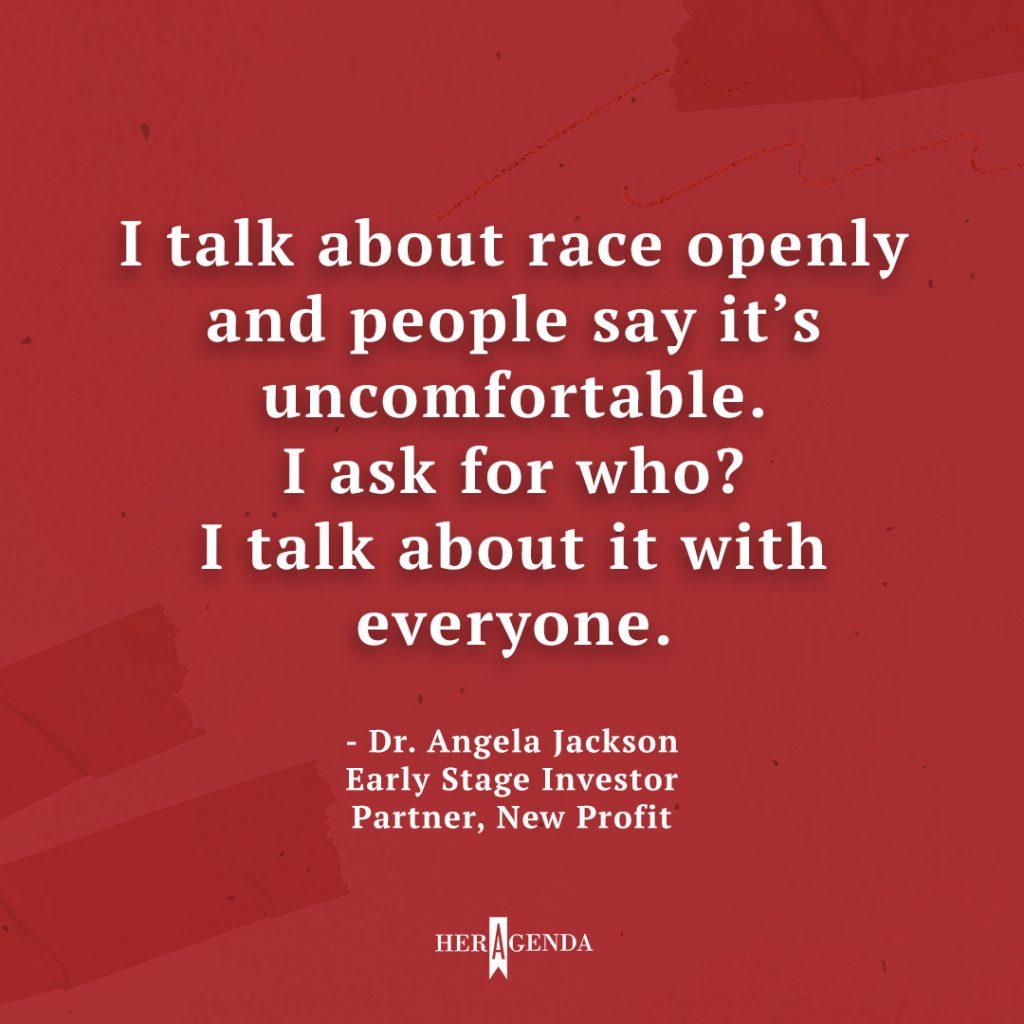
Her Agenda: What is one company and/or initiative within your portfolio that you are most excited about?
Dr. Angela Jackson:There is R3 Score. Check them out, run by a Black woman, they work with the incarcerated to address how they get access to the credit market. This is so imperative because if you don’t have a good credit score it can affect your job housing, and a lot more. She’s using data analytics and alternative ways to give credit to people who have been formerly incarcerated. I love what she’s doing. Another company is Codepath. The founder is helping people access six-figure jobs. And that means for those people, their families, access to now creating generational wealth.
Her Agenda: What is a book you are reading right now?
Dr. Angela Jackson: I’m always reading three or four books at one time, but the one that’s moving me the most is Caste by Isabel Wilkerson. It relates to my work around workforce and education systems also.
[Editor’s note: This interview has been edited for length and clarity.]

